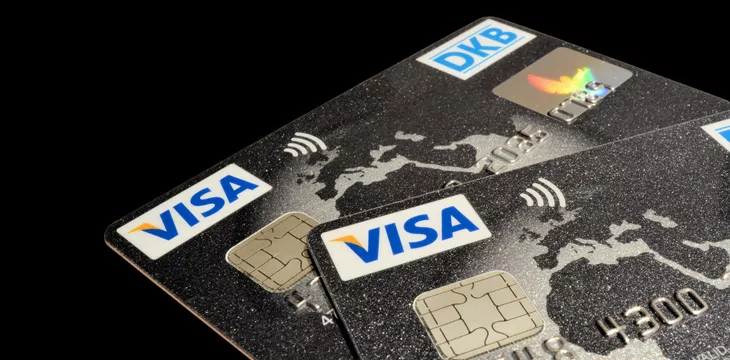|
Getting your Trinity Audio player ready...
|
In its early days, the internet was dismissed by many as a fad that would be forgotten in a few years. Blockchain technology is going through a similar trajectory, and despite the criticism and dismissal, it will blow up and take over, says Visa (NASDAQ: V).
In the early ‘90s, many prominent people predicted that the internet would fail, from astronomer Clifford Stoll to Nobel Prize winner Paul Krugman. Today, we can’t think of a world without the internet, which we rely on for work, leisure, connecting, education, communication, commerce, and much more.
Similarly, the blockchain will become a key technology that will shape our future, says Cuy Sheffield, the head of crypto at Visa. In a recent blog post, Cuy drew parallels between the rise of the two technologies and backed blockchain to take over global payments.
“At Visa, we’ve been at the forefront of payment technology for more than six decades. We saw the potential for the internet in its early days and played a major role in helping it scale and support new forms of commerce. Today, we see significant potential for blockchain networks — and many possible futures,” he stated.
This week, Visa announced that it was expanding its stablecoin capabilities to merchant acquirers. The company is leveraging USDC over blockchain networks to settle fiat-denominated payments, a process it says “improves the speed of cross-border settlement and provides a modern option for our clients to easily send or receive funds.”
Commenting on the stablecoin expansion, Cuy stated, “Visa is committed to being on the forefront of digital currency and blockchain innovation and leveraging these new technologies to help improve the way we move money.”
Blockchain’s broadband era
Payments over the blockchain have been limited for over a decade by an inability to scale on most networks. BTC, which has dominated the industry, can only process about seven transactions per second. In comparison, Visa can hit 24,000 transactions per second.
In comparison, the BSV blockchain can scale to meet global payment needs. In August, the network set a new record at 129 million transactions in 24 hours, which works down to over 1,200 transactions a second.
The network is capable of much more, with Satoshi Nakamoto setting a target of 10 billion transactions per second. While this may sound like too big a number for payment transactions, keep in mind that BSV processes all kinds of data, including underpinning Internet of Things (IoT) systems. Today, there are over 15 billion interconnected IoT devices; by 2025, this number will hit 41 billion.
After scalability, the next biggest challenge for the global adoption of blockchain technology is fees. With networks like BTC, it’s impractical to process microtransactions due to high fees, and Ethereum isn’t any better.
Despite the unbounded scaling, BSV continues to offer the lowest fees of any network. When it set the record with 129 million transactions in a 24-hour period, the network maintained the fees at $0.000007.
Rekord IoT has broken the onchain record, with over 100 million transactions processed in the last 24 hours. Our Bitcoin SV node is crashing constantly due to very limited resources and the high transaction volume. We apologize for the delay and are working to address the issue. pic.twitter.com/bomdbxgJyG
— BSVData (@bsvdata) August 8, 2023
Watch: Blockchain for banking and finance

 07-08-2025
07-08-2025 





